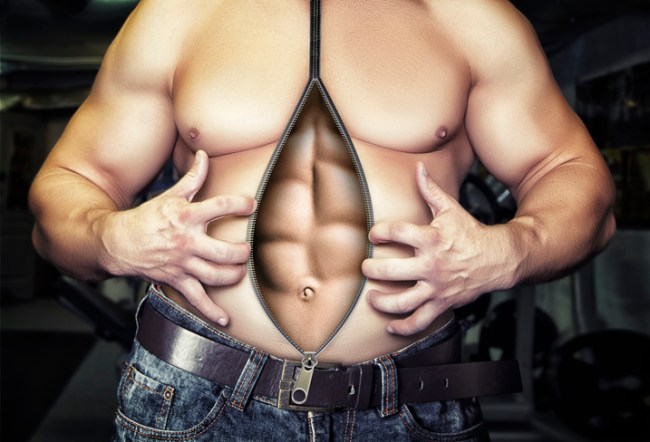
iStockphoto
When it comes to fitness, losing weight is probably the most popular goal for people. That’s why we are listing the 5 keys to fat loss. After all, we live in a country with sky-high obesity rates. Unfortunately, it ‘s also the goal that most people struggle with. And with all the misinformation out there, it’s not really a surprise.
The reality is, while fat loss can be tough, it is certainly not complicated. You just need to have the right set of directions. And here are those directions…
The 5 Biggest Keys To Fat Loss
1. Be in a Caloric Deficit
This is the most important factor in fat loss. If you’re not in a caloric deficit, you can’t lose fat. Period. People love to argue that calories don’t matter and that if you cut carbs, or just eat “clean” you will lose fat. Sorry, but they’re wrong.
In order to lose weight you need to create a negative energy balance, meaning you have to take in fewer calories than you burn. Methods like clean eating may help you do that, but they also may not.
In order to figure out how many calories you should eat to lose fat, take your bodyweight and multiply it by 10-12. This will give you a rough estimate of how many calories you should be eating. If you are a more active person, use 12. If you are less active, use 10. Then use a calorie counting app like MyFitnessPal to track your food intake to make sure you are hitting your number.
2. Eat Enough Protein
Of the three macronutrients (protein, carbs & fat) protein is arguably the most important when it comes to fat loss.
When you’re in a caloric deficit, the body needs to use stored energy to make up that deficit. This stored energy can either come from fat or muscle tissue. However, since muscle gives the body shape and helps keep your metabolism high, we want to preserve it as much as possible. And since protein contains amino acids, the building blocks of muscle, eating the right amount of protein is crucial for maintaining your hard-earned gains.
But how much is the right amount? You will find a number of suggestions all over the internet, but what I have found works best with my clients is anywhere from 0.8 to 1.2 grams per pound of bodyweight.
Eating this much protein also has a few other advantages. It takes the body more energy to digest protein than any other macronutrient. This means that eating more protein boost your calorie burning and slows digestion, keeping you fuller longer.
3. Eat Veggies
Mom was right. You need to eat your veggies, especially if you want to lose fat.
We already know that vegetables are high in vitamins and minerals and that getting your 5 servings a day is beneficial for your health. But veggies, specifically those high in fiber, play a key role in fat loss as well. This is because our bodies can’t digest fiber, meaning we don’t get any calories from it.
What this also means is that it takes the body longer to break down what it can from high fiber foods, thus slowing digestion. So, just like protein, a diet high in fibrous veggies is going to lead to less hunger overall.
In terms of foods for getting lean, veggies are right near the top of the list.
4. Perform Regular Resistance Training

iStockphoto
As far as exercise goes, regular bouts of resistance training provides you with the most bang for your buck and it’s one of the biggest keys to fat loss there is.
Beyond just the general health benefits of resistance training, a fat loss program that includes regular resistance training is going to be much more successful than one that doesn’t. With resistance training you get the added benefit of challenging your muscles, sometimes even to the point where you are adding new muscle while burning fat.
In addition to the calories burned during exercise, resistance training has the added benefit of a high EPOC, or Excess Post-Exercise Oxygen Consumption. Basically what this means is that the body will continue burning calories after you finish exercising. Activities like steady-state cardio have a very low EPOC, while activities like resistance training have a very high EPOC.
Focus on exercises that use many different muscle groups at once, such as squats, deadlifts, rows, pressing and pull-ups.
5. Get Enough Sleep
Of everything on this list, sleep is probably the most overlooked factor when it comes to fat loss. Studies have shown that people who don’t get enough sleep tend to have higher levels of body fat than those who do are well rested.
This is due to a number of reasons. First, sleep has a direct effect on hormone levels, specifically a hormone called cortisol, also known as the stress hormone. Being sleep deprived puts the body in a state of stress, leading to the release of cortisol. Chronically elevated levels of cortisol lead to higher levels of fat storage, greater levels of muscle protein breakdown, and feelings of hunger.
Lack of sleep also inhibits the body’s ability to recover properly. If you are exercising regularly, specifically weight training, this makes it difficult to train with the intensity needed to lose fat and maintain muscle.
Aim for at least 6 hours of sleep per night, with 7-8 being optimal.
Getting shredded is not a complicated process, but it does take some discipline and hard work. Focus on these five keys to fat loss and I guarantee you will see progress.